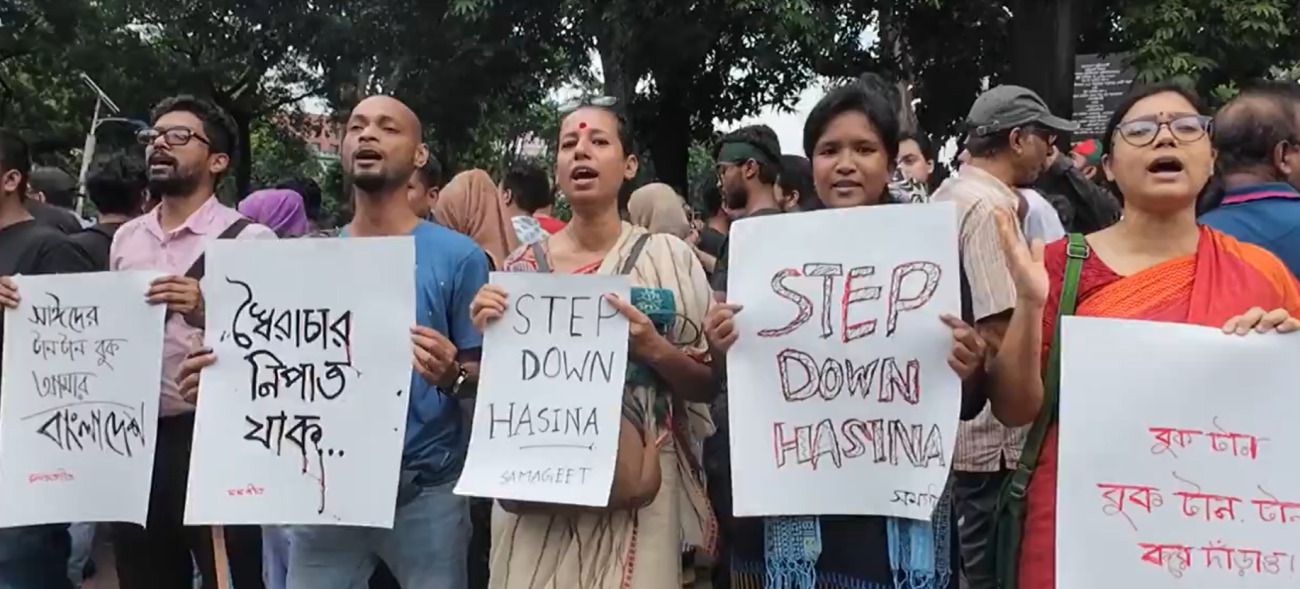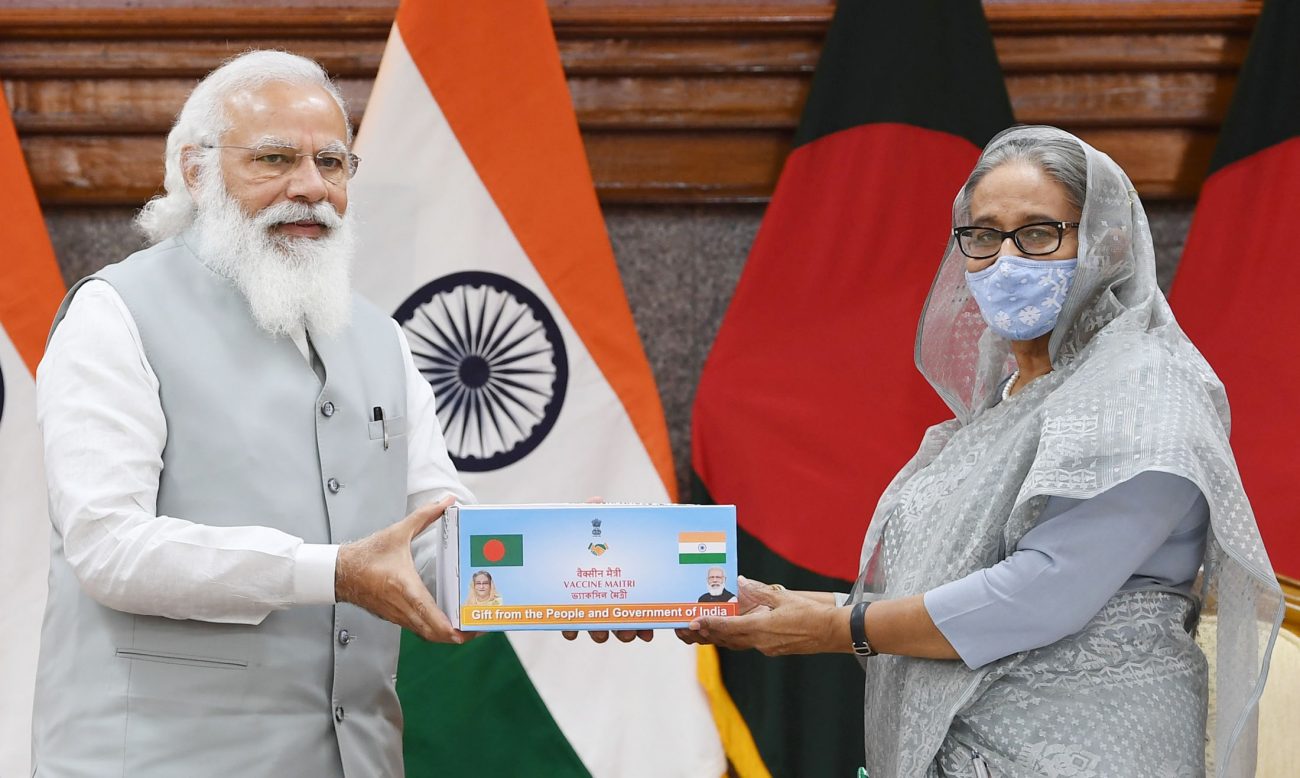Bangladesh’s septuagenarian four-time elected Prime Minister, Sheikh Hasina fled the country on August 5 following a month-long violent student protest. The Bangladesh Army announced the formation of an interim government. Hasina’s fall was another loss of a friend in the long list of countries with whom India’s relationship is on shaky grounds.
Sheikh Hasina has been one of India’s most reliable allies in a neighborhood fraught with anti-Indian feelings. Acknowledged as the “big power” in South Asia, India’s standing in the region has been adversely affected by China’s inroads. Prime Minister Narendra Modi and Sheikh Hasina met for a record 10 times in 2023.
Afghanistan, Maldives, and Myanmar are lost. Its ties with Nepal and Sri Lanka continue to be going back and forth between China and India. Dr. Ian Hall, an international relations expert, concluded that after the fall, India was left with “Bhutan, Mauritius, and Seychelles as the last remaining friendly and stable neighbors.”
For the second time in 50 years, Sheikh Hasina had to seek shelter in India. After being given a 45-minute ultimatum from the Bangladesh Army Chief, Hasina left for Kurmitola in a military helicopter along with her sister. She sought a safe passage from India to a third country, which was promptly granted. From Kurmitola, she is reported to have been moved to a Bangladesh Air Force C-130J tactical aircraft for New Delhi.
It is being speculated that Hasina might be heading to the UK as her sister is already a citizen there.
India’s former Foreign Secretary Nirupama Menon Rao also cautioned New Delhi against acting in haste and to come out on the right side of history. “Five decades ago, when we assisted the birth of Bangladesh in response to a grassroots people’s movement (despite the blatant opposition of both China and the United States), in a glorious exercise of our strategic autonomy, we came out on the right side of history.”
“Today, as we see momentous happenings in Bangladesh and when the voice of the people has seen the flight of Prime Minister Sheikh Hasina from the country, we must weigh our reactions and policy moves with both caution and a capacity to think on our feet with agility, a clear focus and foresight. We cannot afford any misstep. There are strategic dilemmas involved here. Whatever we do, we must protect our long-term national interest,” she wrote on X.
Earlier this year, the newly elected president of the Maldives asked the Indian troops to leave the island country as he forged stronger ties with China.
Afghanistan was lost when the Taliban took over. Sri Lanka dithers in its ties with India. It has halted Chinese survey vessels from docking at its ports, but this sanction will be over by the end of 2024. Lately, Nepal has also been leaning towards China.
India played an instrumental role in the formation of Bangladesh in 1971, when Hasina’s father, Sheikh Mujibur Rehman, led the rebellion in East Pakistan. Over time, India-Bangladesh ties lost their luster as successive political regimes sheltered anti-Indian forces. Hasina drove them out and stabilized ties with New Delhi.
Bangladesh is crucial for India to connect its geographically isolated north-eastern states with the Bay of Bengal.
Prof. Sreeradha Datta from Jindal School of International Affairs at OP Jindal Global University conceded that there would be a period of “instability and hesitation” between the two countries. However, she told the EurAsian Times: “Bangladesh will continue to balance China and India. There is a large constituency in Bangladesh that wants to work closely with China, but there is a limitation to it.”
She added: “Bangladeshi politicians are astute; they will continue to balance China and India. The development projects with India will have to continue if the new government in the country wants to deliver to their people.”

Sheikh Hasina’s Shrinking Political Legacy
The Sheikh Hasina government had been at loggerheads with the US, which made the South Asian country the focal point of its promoting democracy agenda.
In December 2021, Washington sanctioned Bangladesh’s elite security force, the Rapid Action Battalion (RAB), over alleged extrajudicial killings and other human rights violations.
The Biden administration denied Bangladesh an invitation to its 2021 and 2023 global democracy summits. In May 2023, the United States announced it would refuse visas to any Bangladeshi implicated in “undermining the democratic election process in Bangladesh.”
In September, US Secretary of State Antony Blinken announced a policy that reserves the right to deny visas to individuals in Bangladesh who will hinder free and fair elections in the country in January 2024.
India has not been supporting the US-imposed political crisis, which shrank the political space available for Hasina while strengthening the Islamist fundamentalist outfits opposed to her. The Sheikh Hasina government is perhaps India’s closest and only reliable partner in a neighborhood fraught with anti-Indian feelings.
While Bangladesh is not a strategic partner of the US in its Indo-Pacific strategy, its geo-strategic location is no less critical. Bangladesh is located at the apex of the Bay of Bengal, part of the Indian Ocean—a vital transit zone through which an estimated 80 percent of the global maritime trade passes.
The Bay of Bengal is a significant part of the Indian Ocean Region, straddling from Africa to Indonesia. The Bay of Bengal, nestled between India, Myanmar, and Bangladesh, sits on one of the world’s most important strategic chokepoints, the Strait of Malacca that connects the Indian Ocean with the South China Sea.
The US insistence on making an example out of Bangladesh has been straining the ties between the two countries and pushing the country closer to Russia and China.
In March, Sheikh Hasina inaugurated Bangladesh’s first submarine base, Pekua, near the Kutubdia channel in the Bay of Bengal. The base, built at US$1.21 billion, will house two refurbished Chinese submarines that Bangladesh purchased in 2016.
Since 2010, Dhaka has bought arms worth US$2.37 billion from China but only US$123 million worth of weapons from the US.
The mainstay of China’s bilateral relations with Bangladesh is the defense partnership. It began in the 1980s and has grown substantially in subsequent years. Presently, China accounts for 72 percent of Bangladesh’s defense supplies. Dhaka is also the second biggest export destination for Chinese arms after Pakistan.
There has also been an ‘India Out’ campaign in the country. India’s External Affairs Minister S. Jaishankar, however, has refused to be concerned about it.
“There are two realities we must recognize. China is also a neighboring country and, in many ways, will, as part of competitive politics, influence these countries (Maldives, Sri Lanka, and Bangladesh), he said at an event in Mumbai on January 30.

Hasina’s Indian Connection
The ousted Bangladeshi Prime Minister was once a resident of Delhi’s posh Pandara Road neighborhood. Hasina spent six years of her life in exile, residing in Delhi with her children under an assumed identity.
She survived the massacre of her family in 1975. Her father ‘Bangabandhu Sheikh Mujibur Rehman – was assassinated and about 18 members of her family. Those slain included her uncle and 10-year-old younger brother.
Hasina survived by being in Europe with her husband and family. India, led by the late Prime Minister Indira Gandhi, extended help to her. Hasina came to Delhi and lived there until 1981.
- Ritu Sharma has been a journalist for over a decade, writing on defense, foreign affairs, and nuclear technology.
- The author can be reached at ritu.sharma (at) mail.com
- Follow EurAsian Times on Google News




